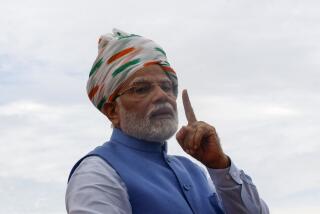India Journalists’ Acceptance of Gifts Stirs Concern
- Share via
BOMBAY, India — The news conference over, reporters stream from a conference room at a plush hotel and line up by a smiling public relations executive who is handing out white envelopes.
Each contains a gift voucher worth 500 rupees--about $14--redeemable at a department store.
Many Indian reporters consider the voucher one of the perks of the job. In one day, an enterprising journalist who carefully picks the news he covers could eat lunch and dinner free at expensive restaurants, and maybe take home a television.
Few of India’s thousands of newspapers have codes of conduct, and many businesses see nothing wrong with trying to win over journalists by lining their pockets. Only now are media-watchers starting to complain about reporters taking gifts, which editors ban in many countries, including the United States.
In India, even the government subsidizes journalists.
The federal government provides low-cost housing to senior journalists in New Delhi, a privilege the Supreme Court sanctified by finding the press to be a pillar of democracy and thus deserving of state support. No one questioned whether journalists beholden to such subsidies could be objective observers of governmental actions and policies.
Accredited journalists covering state capitals also may receive cheap housing and discounts on federal railway lines.
But observers are becoming more worried about journalists and their ties to business.
“In the beginning, gift vouchers were only a token of appreciation to reporters for attending our conferences. But now, journalists don’t like it if you don’t hand out gifts,” said Surujoy Banerjee, who heads Finhans, a public relations firm that organizes news conferences for businesses.
Many journalists say they see nothing wrong in accepting gifts.
“We aren’t asking for gifts. But why should we refuse something small if it’s offered to us?” said one reporter leaving a news conference promoting new stock issues.
But he refused to allow his name to be used.
“When journalists are being paid off like this, can we really believe that they’re giving us objective news?” asked M.V. Kamat, who writes a news media column in a Bombay newspaper.
P.B. Sawant, chairman of the Press Council of India, a public watchdog agency, is more blunt.
“Journalists get sumptuous gifts to write favorable reports about companies. Corruption is growing like cancer,” he said.
As the world’s most populous democracy, India is proud of its unfettered and uncensored press. No one accuses the majority of its news media and reporters of being corrupt or subject to bribery.
But questions are especially rising about potential conflicts of interest among reporters who write about the hundreds of new stocks that are issued each year on the Bombay stock exchange, India’s largest.
“Every new company in the market wants maximum publicity. They’re willing to pay journalists to get it,” Kamat said.
Another potential area of concern for press observers is that many of India’s major newspapers are owned by family groups with wide business interests.
For instance, the Birla group, which owns the Hindustan Times, also runs fertilizer, aluminum and cement plants. The Ambani family owns petrochemical and textile factories, in addition to the Business and Political Observer newspaper.
If their business interests are involved, some publishers have been known to dictate editorial policy, said V. Gangadhar, who writes a column about the news media for Sunday, a respected news weekly magazine.
Some businesses also have accused competitors of influencing news media to run critical stories about them.
“If the price is right, some financial newspapers are not averse to letting companies use their columns to bash the competition,” Gangadhar said.
Temptations can be high.
Ravindra Kumar, managing editor of the respected Statesman newspaper, estimates a business journalist could make as much as $2,000 a month simply by attending news conferences announcing new stock issues.
Senior reporters working for large papers like the Statesman make about 10,000 rupees a month in salary--about $285--barely enough for a lower-middle-class living for a family of four.
But most allegations of corruption involve smaller publications that pay much less. Managers at bigger papers seem more aware of the responsibilities of journalists and are more careful about the people they hire.
A few months ago, Kumar said, a young man being interviewed for the Statesman’s Bombay business desk offered to work for free. “He said he didn’t want a salary. He actually offered to pay us to take him on.”
He wasn’t hired, Kumar said.
More to Read
Sign up for Essential California
The most important California stories and recommendations in your inbox every morning.
You may occasionally receive promotional content from the Los Angeles Times.













